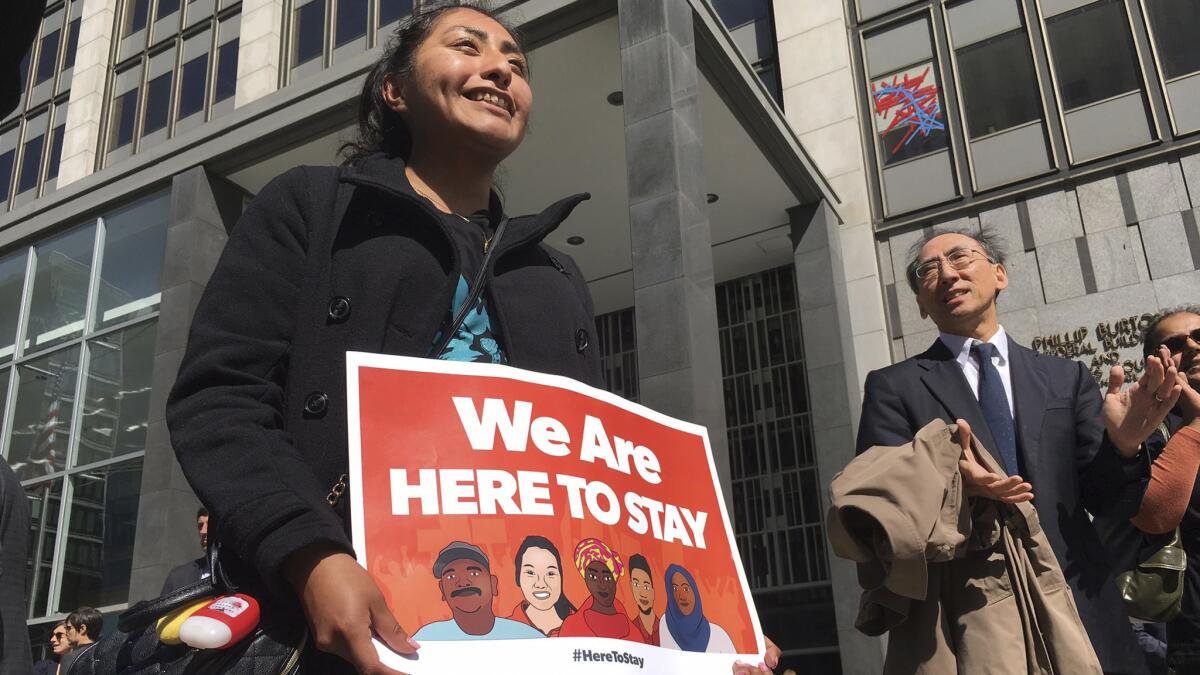U.S. judge blocks Trump order threatening funds for ‘sanctuary’ cities

A federal judge placed a nationwide hold Tuesday on President Trump’s order to strip funds from municipal governments that refuse to cooperate fully with immigration agents.
U.S. District Judge William H. Orrick III, a President Obama appointee based in San Francisco, said Trump’s Jan. 25 order, directed at so-called sanctuary cities and counties, was unconstitutional.
“The Constitution vests the spending powers in Congress, not the president, so the order cannot constitutionally place new conditions on federal funds,” Orrick wrote.
The case was the first legal test of Trump’s order, which has left cities and counties across the nation fearful of losing massive amounts of federal funds.
The Trump administration said it would appeal the decision to the U.S. 9th Circuit Court of Appeals, which already is considering Trump’s revised moratorium on travel from six predominantly Muslim countries.
White House Chief of Staff Reince Priebus, speaking to reporters in his West Wing office, said the decision “will be overturned eventually, and we’ll win at the Supreme Court level.”
“It’s the 9th Circuit going bananas,” Priebus said, though the ruling came at the district court level.
Tuesday’s ruling stemmed from lawsuits by San Francisco and Santa Clara County challenging the order. Among other claims, the suits argued that the directive violated the 10th Amendment, which protects states from federal government interference.
The Trump Administration had argued the counties lacked standing or legal authority to challenge the order because they had not yet suffered any harm.
But Orrick said a preliminary injunction to block the order was needed to prevent upheaval in the counties’ budgeting process.
“The order has caused budget uncertainty by threatening to deprive the counties of hundreds of millions of dollars in federal grants that support core services,” the judge said.
He stressed that his decision will not prevent federal officials from designating local municipalities as sanctuaries or from enforcing existing conditions on grant money.
The ruling flatly rejected a last-minute bid by a lawyer for the Justice Department to downplay the significance and reach of Trump’s order.
The government’s attorney told the judge during an April 14 hearing that the order would affect only limited law enforcement grants handed down by the Justice Department and the Office of Homeland Security — not all of the billions in funding local municipalities receive from the federal government.
That “new interpretation” of the sanctuary order was “not legally plausible,” the judge said.
The wording of the order — and statements made by Trump and Atty. Gen. Jeff Sessions — make clear it was intended to threaten all federal funds, the judge said.
“If there was doubt about the scope of the order, the president and attorney general have erased it with their public comments,” Orrick wrote. “The president has called it ‘a weapon’ to use against jurisdictions that disagree with his preferred policies of immigration enforcement.”
Orrick also noted that the federal government may not legally compel counties to hold inmates who are in the country illegally in jail beyond their release dates.
Counties that do detain immigrants until federal agents can take them face liability under the 4th Amendment’s guarantee of freedom from seizure.
But Trump’s order can be read as requiring states and municipalities to honor such detainer requests to avoid being designated sanctuary jurisdictions, Orrick said.
The judge said the order ran afoul of the Constitution in various ways, violating the separation of powers doctrine, guarantees of due process and the 10th Amendment right of states and cities to self-govern.
The federal government “cannot use the spending power in a way that compels local jurisdictions to adopt certain policies,” Orrick wrote, citing a Supreme Court ruling against part of Obamacare.
He described Trump’s order as vague. It “has caused substantial confusion and justified fear among states and local jurisdictions that they will lose all federal grant funding at the very least,” he wrote.
A spokesman for the Justice Department said the administration will follow the law “with respect to regulation of sanctuary jurisdictions” and enforce existing grant conditions.
San Francisco Mayor Ed Lee said the city would continue to be a sanctuary jurisdiction. If the federal government believes a serious criminal should be detained, it can obtain a criminal warrant, he said. The city has always honored them.
“We know that sanctuary cities are safer, healthier, more productive places to live,” Lee said.
Dave Cortese, president of the Santa Clara County Board of Supervisors, declared that “the politics of fear has just suffered a major setback.”
“Millions of people across the country can continue to receive essential medical care, go to school and remain active members of their communities without fear that their local governments are being forced to work against them,” Cortese said.
Cities and counties around the nation have reacted differently to Trump’s order.
The mayor of Miami-Dade County immediately directed jail officials to honor all requests by immigration agents because he said he feared the county could lose $355 million a year in federal funding.
Santa Clara County officials had argued the order threatened $1.7 billion in annual federal funding. San Francisco said it stands to lose at least $1.2 billion a year.
Times staff writers Brian Bennett, James Queally and Jaweed Kaleem contributed to this report.
Twitter: @mauradolan
Twitter: @joelrubin
ALSO
Trump backs off border wall fight for now, easing government shutdown threat
Flynn did not disclose lobbying and payments from Turkey and Russia, lawmakers say
Trump’s first 100 days accomplished little but changed a lot
UPDATES:
6:10 p.m.: This article was update with additional reaction.
2:50 p.m.: This article was updated with reaction and additional details from the ruling.
This article was originally posted at 1:40 p.m.
More to Read
Start your day right
Sign up for Essential California for news, features and recommendations from the L.A. Times and beyond in your inbox six days a week.
You may occasionally receive promotional content from the Los Angeles Times.








